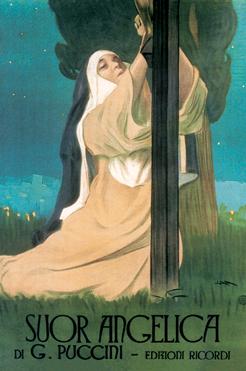
By Anthony Lucci—
Captivatingly beautiful, Suor Angelica at the West Side Theatre, performed by the New Jersey City University music department, is an Italian opera written by Giacomo Puccini. In typical fashion, it ends in tragedy. The Thursday night performance lent itself to the audience, not allowing foreign language to act as a barrier for those who sat dazzled by the arias and solos.
Angelica retells the story of a woman who must repent for her carnal sin of having a child out of wedlock. Her parents, coldly and unfeelingly, force her into a convent to atone for her missteps. Passion and insanity overtake her in an effort to see her son again, as the child was ripped from her arms upon her entrance into a house of God. Madness drives her to a suicide attempt and before she dies, she realizes her soul has been condemned to hell.
The scenery was a poignant assortment of paintings of Madonna and a sprawling garden. The subtle arrangement of the set did not change throughout the show, but the lack of focus on the underwhelming background allowed for a deep perception of the meaning of the performance.
The female performers, distinctly chosen from the voice department, did not lead the audience astray. The voices of angels hypnotized those who watched and brought tears to the eyes of those who heard their songs. The actresses took spectators on a magical and emotional journey with their words. Despite the international tongue, the connection between performer and listener was robust and significant to the experience.
No transparent separation between scenes could be felt; the transition from sight to setting was indistinct and graceful. The emotions, however, were multifaceted and varied. In one scene, the audience felt the joy and passion of the actors; in the next, uncontrollable sadness struck viewers.
The feeling involved with the performance left many breathless, waiting for the heart-stopping action to continue. The truly professional performance was completed by a troupe of women who are destined for operatic greatness.








